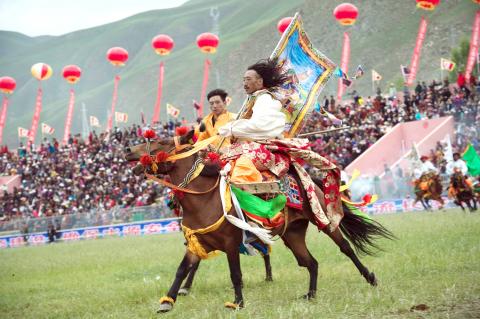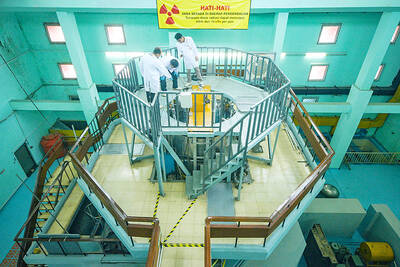As Tibetan riders waved rifles and dug cowboy-booted feet into their horses’ flanks, hanging sideways from their mounts, tourists and locals cheered and snapped photographs on digital cameras and smartphones.
Set between emerald hills on the Himalayan plateau, about 3,700m above sea level, Yushu’s annual horse festival is billed as a showcase of Chinese government support for Tibetan culture.
Women were draped in their finest jewelry, wearing beads of turquoise, yellow amber and red coral over flower-patterned traditional dresses known as chuba. Monks in crimson robes flitted through the crowds.

Photo: AFP
However, beyond the imagery, the festival also displayed the impact of both modernization and Beijing’s rule on the region, which Chinese forces occupied in 1951.
Many Tibetans have traded nomadism for life in the cities as part of an urbanization drive pushed by Beijing, sometimes by force, and many who remain on the land prefer motorbikes for road transport.
“I’m just not that good at riding any more,” said 31-year-old nomad Jargaringqin, chewing on yak jerky as dried dung burned in his stove.
Yushu — known as Jyekundo in Tibetan and now in the northwestern Chinese province of Qinghai — is home to the Khampa, a traditionally martial people whose dialect is impenetrable to most Tibetans.
In the late 1950s the Khampa — sometimes aided by CIA training and weapons — staged the fiercest Tibetan resistance to Chinese rule, killing 800 Chinese Communist Party (CCP) soldiers in one raid.
Their forces were crushed after Tibetan spiritual leader the Dalai Lama fled to India in 1959. Herders had their guns confiscated, but the weapons made a comeback in tourist displays at the five-day event, which saw male riders competing in speed races and trotting competitions.
The festival was suspended for several years following a major earthquake that ravaged Yushu in 2008, killing about 2,700 people.
As part of reconstruction, authorities built a horse-racing stadium with concrete stands and plastic seating to host the festival’s opening ceremony.
Local authorities tout the festival as a source of tourist revenue for the area, which has few other sources of economic growth.
Many Han Chinese see Kham as a mysterious and romantic region.
“It is pretty and the horse-riding skills are great,” said Han Chinese tour guide Zhao Xu.
However, attendance at the event last week was sparse, raising questions over how well modernization fits with tradition.
Qinghai’s urbanization rate has increased from 40 to about 50 percent in the past decade, but one Tibetan member of a local CCP committee said that the process was happening “too fast.”
“It is fine to move people to cities, but where are the jobs?” asked the man, whose first name was Dorje. “Herding life was certainly better.”
However, spectator Meiduo Lasang dreams of becoming a photographer or fashion designer.
A university student in the provincial capital, she sheepishly accepted a herder’s invitation to clamber on top of his steed, laughing and posing for smartphone photographs before quickly jumping off.
“We don’t own horses these days,” she said. “Everyone used to, when transport was more backwards. Now we have vehicles there is no need for horses.”

Four people jailed in the landmark Hong Kong national security trial of "47 democrats" accused of conspiracy to commit subversion were freed today after more than four years behind bars, the second group to be released in a month. Among those freed was long-time political and LGBTQ activist Jimmy Sham (岑子杰), who also led one of Hong Kong’s largest pro-democracy groups, the Civil Human Rights Front, which disbanded in 2021. "Let me spend some time with my family," Sham said after arriving at his home in the Kowloon district of Jordan. "I don’t know how to plan ahead because, to me, it feels

Poland is set to hold a presidential runoff election today between two candidates offering starkly different visions for the country’s future. The winner would succeed Polish President Andrzej Duda, a conservative who is finishing his second and final term. The outcome would determine whether Poland embraces a nationalist populist trajectory or pivots more fully toward liberal, pro-European policies. An exit poll by Ipsos would be released when polls close today at 9pm local time, with a margin of error of plus or minus 2 percentage points. Final results are expected tomorrow. Whoever wins can be expected to either help or hinder the

North Korea has detained another official over last week’s failed launch of a warship, which damaged the naval destroyer, state media reported yesterday. Pyongyang announced “a serious accident” at Wednesday last week’s launch ceremony, which crushed sections of the bottom of the new destroyer. North Korean leader Kim Jong-un called the mishap a “criminal act caused by absolute carelessness.” Ri Hyong-son, vice department director of the Munitions Industry Department of the Party Central Committee, was summoned and detained on Sunday, the Korean Central News Agency (KCNA) reported. He was “greatly responsible for the occurrence of the serious accident,” it said. Ri is the fourth person

SKEPTICAL: Given the challenges, which include waste disposal and potential domestic opposition, experts warn that the 2032 nuclear timeline is overambitious Indonesia is hoping going nuclear can help it meet soaring energy demand while taming emissions, but faces serious challenges to its goal of a first small modular reactor by 2032. Its first experiment with nuclear energy dates to February 1965, when then-Indonesian president Sukarno inaugurated a test reactor. Sixty years later, Southeast Asia’s largest economy has three research reactors, but no nuclear power plants for electricity. Abundant reserves of polluting coal have so far met the enormous archipelago’s energy needs, but “nuclear will be necessary to constrain the rise of and eventually reduce emissions,” said Philip Andrews-Speed, a senior research fellow at the